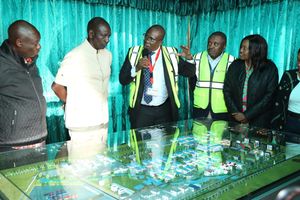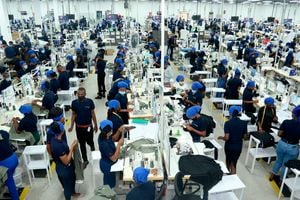
Special economic zone.
After years of minimal activity, Kenya’s Special Economic Zones (SEZs) are coming of age, with an increasing number of new entrants within the last two years serving as an indicator of renewed investor confidence in the country.
Recently, Global Customer Acquisition and Engagement firm CCI announced that it will be tapping into a new business process outsourcing facility at Eneo in Tatu City Special Economic Zone.
The facility, developed by Gateway Real Estate Africa (GREA), comprises two towers with a combined gross lettable area of approximately 26,000 square metres, interconnected by a number of convenience retail shops.
Weeks before CCI made its move, President William Ruto had issued enterprise licences to six companies that were setting up at the Naivasha Special Economic Zone.
This came as a relief after years of limited activity at the SEZs brought about by lack of adequate funds to set up infrastructure including roads, power and water, necessary to attract investors.
The firms that were licenced operate across different sectors of the economy including bottling, automotive, logistics, power, energy, steel and plant essence extraction.
“The entry of new investors demonstrates the positive effect of Kenya’s policy and regulatory environment, vindicating our vision of mobilising and leveraging private investment as the primary driver of economic growth in our country,” said President Ruto.
Weeks before this, German-based cleaning equipment manufacturer Karcher invested € 3 million (approximately Sh493 million in current exchange rate), in a regional distribution centre at the Freight Forwarders Solutions warehouse in Tatu City SEZ.
Disrupting shipping activities
With conflicts in the Middle East disrupting shipping activities along key supply routes such as the Red Sea, the firm’s management said the move to Kenya would help it brace the impacts of external shocks.
“The government recognises this move as an investment on value chains, employment created and we are committed to making the economic environment good for you and other investors,” said Joseph Nguyo, Senior Deputy Secretary, State Department for Investment Promotion.
Reports from the Special Economic Zones Authority (SEZA) indicate that within the past one year, the authority has issued licences to more than 21 enterprises that have invested about $32 million (Sh4.2 billion) in the country. Cumulatively, the authority has licenced more than 50 enterprises to operate at the SEZs.

From left: Greg Pearson, GREA Chief Executive Officer, Rishi Jatania, Managing Director CCI Kenya, and Perminas Marisi, Head Of City Management & DCC at Tatu City. Kenya’s largest contact centre will employ thousands of young people. The facility is expected to open its doors at the end of next year to provide business process outsourcing that supports customer lifecycle in traditional voice interactions as well as digital.
Steps to revitalise Kenya’s special economic zones to maximise their potential began mid last year, when the Finance Act 2023 was passed, creating provisions of local market access for SEZ goods as well as improved fiscal incentives like exemption of capital gain and withholding taxes.
“Since the export services tax was lifted by the current administration, American companies JetBlue, AT&T and T Mobile have all started operations with CCI in Kenya, creating over 1000 jobs,” said Meg Whitman, the United States Ambassador to Kenya.
Other incentives at the SEZs include availability of land for development at discounted rates, quick approval of construction permits, with only one licence being required to operate in the SEZs.
Developers of more than 100 low-cost residential units are also offered incentives such as 15 percent corporate tax as opposed to the standard 30 percent tax rate for developers operating outside the SEZs.
“Ultimately, it comes down to cost, if it is going to be more expensive for us in terms of construction cost here, then we won’t be very competitive compared to other destinations where we do business,” says Greg Pearson, chief executive officer and co-founder of GREA.
Advancements in technology, as well as the availability of skilled personnel to develop buildings to international standards have also contributed to the growth in development activity at the SEZs.
“When you look at the Eneo building at Tatu, we moved away from the traditional reinforced concrete slab and went into using a post tension slab for the floor plates. The benefit of using a post tension slab is that you can build faster,” states Pumi Lukhele, GREA’s Head of Development and Construction.
While it takes 28 days to do another slab using the traditional reinforced concrete, the post tension slab turnaround time is 14 days. It’s also possible to build larger floor plates using the post tension slab, which is what most international clients look for.
Congested urban areas
“Lack of scalable projects has been a challenge that has previously kept investors from tapping into the local market, but this is changing,” says Pumi.
She adds that with businesses increasingly shifting from congested urban areas to decentralised environments that provide live-work-play solutions for their employees, SEZs are also providing a viable alternative to town setups.
“People are moving away from cities due to relatively high urbanisation and population growth rates, finding the SEZs, which have improved infrastructure and essential amenities such as schools and hospitals, as more desirable places to work and live,” said Pumi.
The SEZs also have more favourable energy tariffs, with power tariffs for all SEZs, except Naivasha SEZ, gazetted at Sh10 per kilowatt hour and Sh7.42 per kilowatt hour off peak, which is lower than the national average of between Sh20 to 25 per kilowatt hour.
“Most governments focused on development are now using special economic zone instruments to attract foreign direct investments into their countries. We should not be left behind,” said Kenneth Langat, CEO of the Special Economic Zones Authority (SEZA).
According to studies, out of a total $1.34 trillion issued globally in the form of FDIs, Africa receives only about $80 billion, while the East African region receives only about $10 billion.
“This FDI space is very important for us and we need to compete for it. In order to do that, we need to deliberately put up an environment that will attract these investments,” says Langat.
The SEZs were first established in 2015, when the country enacted a law that would facilitate the creation of economic hubs whose purpose would be to drive economic growth and transformation of the country into a middle-income economy.

The CCI contact centre at Eneo in Tatu City Special Economic Zone. There has been a growing number of developments in the Special Economic Zones within the past one year on renewed investor confidence in the country.
They were classified into Agricultural Zones for agricultural sector activities, Business Service Parks for provision of business services, Tourist and Recreational Zones for hospitality activities, Free Trade Zones for transshipment and storage of goods, Industrial Parks for manufacturing and processing activities, and Science and Technology parks for ICT related activities.
As it stands, there are currently 37 gazetted special economic zones in the country, 30 of which are privately owned, while seven are owned by the government.
Nine new zones were gazetted between 2023 and 2024, including Riwa, Rivatex, Premier Foods Industry, Mt Elgon Orchards, International Controls, Mitchell Cotts Freight Kenya, Kingsway Industrial Park, Sagana Agro-Industrial City and Rock Plant SEZ.
Some of the State owned SEZs include Konza Technopolis City, a science and technology hub which sits on 5,000 acres of land in Malili, Makueni County, Naivasha SEZ which sits on 1000 acres of land in Nakuru County and Dongo Kundu SEZ, which sits on 3000 acres of land in Mombasa County.
The government recently announced plans to establish a medical industrial specialised public special economic zone in Kericho on a 500-acre piece of land donated by the county government. The SEZ is expected to inject resources worth more than Sh3 billion in Kericho.
Some of the privately owned SEZs in Kenya include Tatu City, the first operational mixed-use SEZ in the country. It sits on 5,000 acres of land in Ruiru, Kiambu County.

L-R: Solomon Mahinda, Executive Vice President, Tatu City, welcomes President William Ruto to the opening ceremony of CCI Global, Africa's leading outsourcing firm, at Tatu City.
“The SEZs are controlled environments, so when the investors come, they know they will not have to worry about what their neighbour is doing, they also don’t have to worry about things such as power, infrastructure, water or ICT,” said Stephen Jennings, Founder and CEO of Rendeavour, the developer of Tatu City.
Other privately owned SEZs in the country include SBM SEZ in Kwale County, Africa Economic Zone in Eldoret, Compact Free Trade Zone in Nairobi, Kipipiri SEZ in Nyandarua, Kipevu LPG SEZ, Kipevu Free Trade Zone and Focus Free Trade Zone in Mombasa, Lamu Resort City, Sleeping Warrior SEZ in Nakuru, and the Northlands in Kiambu.
A number of factors still continue to impede the SEZs from achieving their full potential, including political interference, land ownership issues, lack of clarity on the framework governing the SEZs and corruption.
In May this year, Members of Parliament raised concerns over exploitation of the SEZs by unscrupulous land dealers who purportedly sell the land within SEZs without paying taxes and duties, wooing unsuspecting Kenyans and investors into economic exploitation without any economic benefits.
“From the foregoing state of affairs, there could be pointers to a likelihood of a compromised integrity of the Special Economic Zones,” noted Mbeere North MP Ruku Kiringa.
As a result, the MPs noted that the number of businesses operating at the SEZs have remained incommensurate to the large number of gazetted zones as well as tax incentives offered there.
The MPs also noted that they had received complaints that some entities operating in the SEZs were conducting activities that they were not licenced for.
“Complaints have been raised that some entities registered under SEZ are exploiting the privilege to engage in other activities like property and land transactions, thus denying the country the much-needed revenue,” noted National Assembly Finance Committee chair Kimani Kuria.
Figures from the Kenya Revenue Authority (KRA) show that between 2015, when the SEZs were first operationalised and 2023, companies operating in the zones were exempted from paying Sh1.98 billion in taxes and other levies.
Some inefficiencies in the land registries have also been an issue that has contributed to an increase in the time taken to conduct due diligence or to acquire land within the SEZs.
Whilst the law anticipates a ‘one-stop-shop’ model for SEZ licensing and operations, SEZ developers and operators also still reportedly have to obtain a number of licenses from different licensing authorities before they can effectively implement their projects.










